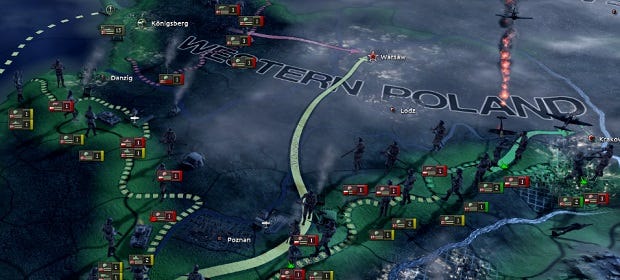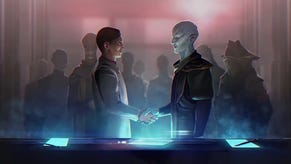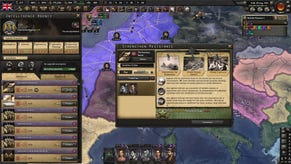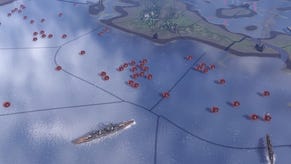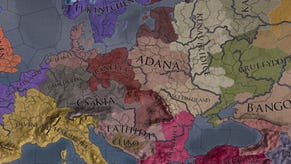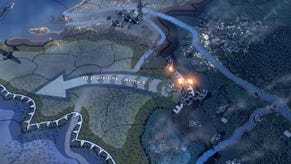Hands On: Hearts Of Iron IV
Ferric Oxide
The first time I moved to the unsteady beat of Hearts of Iron IV [official site], I played as Germany and managed to avoid the catastrophe of World War II by fudging my initial invasion plans so badly that the French were preparing to march on Berlin by 1938. France, like every other nation, had been controlled by the AI.
This time around, I played two games. Two games in a world populated by around twenty human players, controlling all of the major powers and some minor players. The first time around, I was outside the main theater, attempting to transform Brazil into a major trading power. When that world tore itself apart, I picked Japan in a draft and set about taming the Russian Bear with a little help from my friends.
Playing Hearts of Iron IV in its current state is a curious experience. There is a distinct tension between the careful scripting of the central events, the fine balance of the Axis-Allies division and the free-form sandbox of Paradox grand strategy. As we found, on both occasions, the German player can be punished severely for stepping out of line and the National Focus feature helps to guide them along that line, a historical bellwether that is instructive and potentially restrictive. This is a sandbox but there are broken bottles hidden just beneath the surface. Digging deep is dangerous.
All of the major nations have a unique National Focus tree (minor nations have generic trees), leading them through key military and political events of the time, helping them to avoid the glass. As Japan, I found myself directed toward either the North or the South, the latter eventually leading to a Pacific War and conflict with America while the former (which I chose) militarises the mainland border with the Soviet Union. While the focus creates a binary choice, nothing is locked down. It'd be entirely possible to focus on northern expansion and then invade China, or jump into an alliance with the Soviets. Choosing a focus provides shortcuts, often avoiding the need to accumulate and spend masses of political power in order to create a wargoal, but it doesn't preclude seemingly contrary behaviour.
Germany, as you might expect, is an altogether unique proposition. Having watched two accomplished strategic minds and students of the war fail to survive the thirties, I spent a good part of the session pondering the German situation. My reasoning is inexpert (I didn't play as the Germans in this build) and a great deal will change before release, but I became convinced that Germany lacks freedom of expression in the early game. If the war starts too early, France and the UK are too powerful for the half-reconstructed German military, and if the major landmarks of remilitirisation, annexation and anschluss aren't triggered in sequence and approximately within the correct historical timeframe, disaster is sure to follow.
Disaster for the Germans, that is. In the first game, while I was leading my Boys From Brazil in a brutally unforgiving war against themselves (more of which later), the German player decided to deviate from history in an attempt to confuse the Allied faction. There was no sign of aggression until, a couple of years into the game, Luxembourg fell. From my South American vantage point, I couldn't work out exactly what the long-term plan for European domination was, but there appeared to be political pressure in the Baltic States and Scandinavia, where Fascist parties were receiving support from Germany and friends.
The Luxembourg seizure was the highlight of German aggression, however. Shortly afterwards, an ill-timed national decision gave the Allies permission to declare war, and the Americans had landed in Germany long before Christmas 1940. The war was over before it had really begun, Germany contained by the British navy, a giddily enthusiastic France, and a boldly interventionist U S of A. The Americans were a problem in both games. To shift from their isolationist stance, they require political capital and a global rise in tension. At present, particularly in such a large multiplayer game, global tension doesn't function particularly well.
Represented by a percentage point ticker at the top of the screen, tension rises as certain events occur, either through national focus scripting or other acts of aggression. Hover your cursor over the figure and a window pops up, breaking down precisely what is contributing to the overall score. As well as providing a snapshot of the world's fragility, the tension score directly controls the actions available to each nation. Depending on your level of isolationism and military preparedness, tension must be at a certain level before you can join a (or THE) war. This ties the Americans down in the early game, as they must move through the gears before throwing their muscle across the Atlantic.
That's how America should work in theory, at any rate. In both of the games we played, the Americans were on the scene before the Axis powers had even begun their conquest of Europe, responding like a well-trained gundog to the first shots fired. That's partly because a human player will almost always WANT to be involved in European affairs, pushing everything toward intervention even before the war starts. The early entrance into combat is also a function of the global tension rising too quickly. This is something that will be balanced – and in singleplayer or with two or three human participants it's unlikely to be as much of an issue – but it highlights the incredibly difficult balancing act that Paradox are attempting to pull off.
At the moment, it feels as if Germany needs to be played by someone willing to sacrifice freedom for ruthless efficiency. No matter how appropriate you might think that is (grand strategy as performance art political statement?), frustration can set in. The German starting position is so precarious that it makes little sense to ignore the guide laid out by min-maxing expert Adolf Hitler, ramping up military production to an extraordinary degree before poking Europe's soft underbelly. The early years, before the war begins in earnest, may be too restrictive. They're an opportunity to concentrate on the military-industrial supply chains and trade that are as important to success as combat, but they also seem like an opportunity to experiment. Current evidence suggests that, for Germany at least, experimentation can bring the game to an early finish.
My Brazil experiences were packed with experiments. I signed up with the Axis as soon as the war began, forging a quiet alliance with Argentina as we prepared to conquer the entirety of South America. We had our sights set on Central America and a long war with the USA, which had committed the bulk of its forces to Europe, but it wasn't to be.
Preparing to seize Venezuela, I gathered a force of almost half a million men, with transport ships prepared to carry them around the north-eastern coast to attack from the sea. That was partly because I liked the idea of a ridiculously large marine invasion and partly because I didn't fancy trekking through the Amazon. A combination of interface confusion and my own cackhandedness meant that my troops attempted to board the transports FROM the Amazon. They spent less than two weeks in the deep rainforest, with no logistical support, no supply lines and no direct route to the boats. It was enough to kill 350,000 of them.
Lessons learned: never fight a land war in Brazil (even if there is no enemy involved), always check support and supply levels for a region before committing troops (an army marches on its belly; in this case, literally, as they crawled to their doom) and do not entirely trust the current user interface. I definitely clicked in the wrong place while attempting to commit my army to the boats and should never have lumped so many companies together in the first place, but hundreds of thousands of dead because of a couple of errant clicks? Harsh.
War is harsh, of course, and particularly so when there are nineteen people playing at the same time, making it impossible to pause at will. Across two days of playing, I found myself in conflict with the command interface more often than I found myself in actual conflicts. As Japan, having formed the Sino-Japanese Syndicate with my neighbour who was controlling China, the way on the Soviets was a great success. We took control of Vladivostok, most of Mongolia and were pushing North to claim the entire Eastern coast. Splendid. Except, all of the clever plans I formulated swiftly fell by the wayside, replaced by brute force.
In theory, the battle interface is a smart combination of high level strategy and more intricate tactical considerations. Companies can be grouped under the leadership of a single character, bestowing bonuses on them, and orders are given to the collection as a whole. Fronts can be painted across borders, causing soldiers to spread themselves evenly across the line. Attack plans can then be drawn onto the map, defensive lines placed and pincer movements planned. With the plans in place, the group waits until the order to execute the plan comes down from on high.
In practice, drawing plans is somewhat inelegant, spaghetti-like masses of lines criss-crossing one another as orders pile up. Again, it's worth stressing that: a) the interface isn't ready yet b) I'm not hugely experienced with this iteration of Hearts of Iron c) multiplayer real-time strategy is played a faster pace than singleplayer. If I'm playing solo, there's no way in hell I'll ever fiddle with plans while the game is running and with the world paused, I can tinker away to my heart-of-cotton's content. In the fight against the Soviets, I found myself resorting to CK/EU tactics however, simply selecting huge groups of soldiers and right clicking on the region I wanted them to invade. It was so effective - partly because the Allies had opened up a path to Moscow which had distracted my Russian chum somewhat - that I didn't consider the complexities of proper planning for the rest of the session.
Playing as most people will, solo and slowly, the interface issues might not be as noticeable. It's worth stressing again that there is plenty of time to iron out the wrinkles - Paradox are showing the game early and they're fully aware that there is still work to be done. I suspect that some of my doubts relate to the actual direction of Hearts of Iron though, caught somewhere between grand strategy and focused wargame. The best way to play Germany, as I've been attempting to do in a couple of solo experiments, appears to involve following the historical script until everything falls apart. Pre-empt the mistakes and avoid them while sticking with the plans that worked. The delicate nature of the European situation means that everything can collapse in a few in-game weeks and the (current) inflexible nature of the Axis and Allied factions doesn't allow for the truly weird alternate histories that EU IV or CK II can generate.
The hope is that HOI IV is at a pivotal stage of development. All of the foundations are in place and there are plenty of cleverly designed systems in place. I particularly enjoy the smooth flow of military production, which requires little in the way of micromanagement but - once the process is fully understood - allows an enormous amount of control over the composition and deloyment of forces.
But if the foundations are strong, the structure on top of them still seems dangerously unbalanced. In the current build, the Americans and Germans are both capable of toppling it by leaning in the wrong direction at the wrong time. These are multiplayer problems to an extent. Throw a bunch of people into any game and they'll try to break it, sometimes unintentionally. People behave in ways that the AI never will, either through lack of experience, or because they're made of meat and jelly rather than circuits and other clever things. There's a thrill to that and even when my Brazilian adventure ended so terribly, I loved watching the weird wars unfolding across the globe.
Long-term though, I'm not entirely sure if Hearts of Iron will find the sweet spot it's searching for, the one that encourages strategic experimentation while maintaining at least the outline of its historical house of cards. I'm not sure that it can find that sweet spot but I'm glad there's more development time to search for it. Whatever else it might be when it finally releases, Hearts of Iron IV is unlikely to be dull - it's packed with far too many interesting systems and scenarios - but I'm not yet convinced its hybrid approach will lend it the lasting appeal of its grand strategy stablemates, or the careful deliberation of the best wargames.
